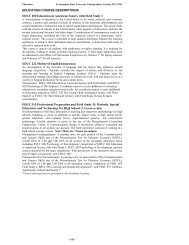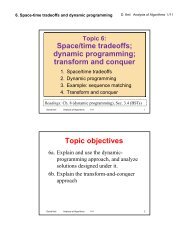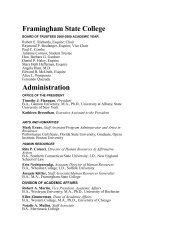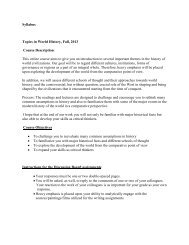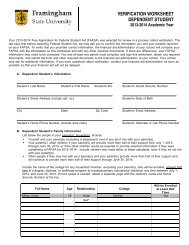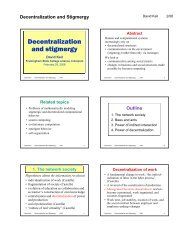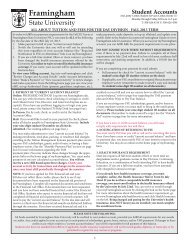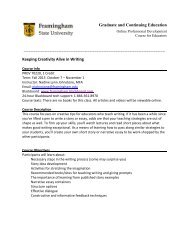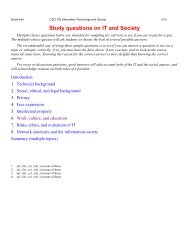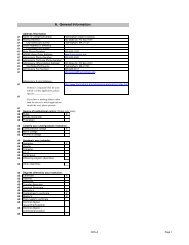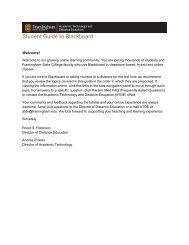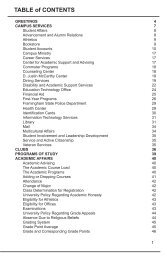Economics and Business Administration - Framingham State ...
Economics and Business Administration - Framingham State ...
Economics and Business Administration - Framingham State ...
Create successful ePaper yourself
Turn your PDF publications into a flip-book with our unique Google optimized e-Paper software.
<strong>Framingham</strong> <strong>State</strong> College Undergraduate Catalog 2008-2009 <strong>Economics</strong> <strong>and</strong> <strong>Business</strong> 151<br />
eCon 312 Comparative economic Systems<br />
A study of the different systems societies use to organize economic activity. The course<br />
covers the historical development of theories of capitalism, socialism, market socialism<br />
<strong>and</strong> communism, <strong>and</strong> compares these theoretical models. Considerable time is then spent<br />
analyzing how these systems work in practice by examining real-world examples of each.<br />
The relationship between the economic system <strong>and</strong> the social, cultural, historical <strong>and</strong>/or<br />
political forces in these nations is emphasized. Comparisons are made not only between<br />
nations that employ different systems, but also between nations that use variations of the<br />
same type of system. The course also examines the economics of transition from one type<br />
of system to another. Prerequisites: ECON 101 Principles of Macroeconomics <strong>and</strong> ECON 102<br />
Principles of Microeconomics.<br />
eCon 435 Managerial economics<br />
An application of the analytical tools of microeconomics to solving business problems.<br />
Topics included are criteria for business decisions, pricing <strong>and</strong> promotion decisions;<br />
expenditure, cost, <strong>and</strong> production decisions; the estimation of production costs <strong>and</strong><br />
consumer dem<strong>and</strong>; <strong>and</strong> the estimation of the cost of capital <strong>and</strong> investment decisions.<br />
Prerequisite: ECON 101 Principles of Macroeconomics <strong>and</strong> ECON 102 Principles of<br />
Microeconomics.<br />
eCon 450 History of economic thought<br />
The historical development of classical economics from its origin in the works of the<br />
schoolmen <strong>and</strong> Physiocracy to its culmination in A. Smith, <strong>and</strong> nineteenth century<br />
English liberalism. The criticism of classical tenets by writers like Malthus <strong>and</strong> Marx<br />
are evaluated. The neoclassical economics of Marshall <strong>and</strong> Pigou are developed from<br />
both Austrian <strong>and</strong> English marginalism. Keynesian Macroeconomics is developed <strong>and</strong><br />
evaluated in the context of contemporary economic developments. Prerequisite: ECON<br />
301 Intermediate Macroeconomic Theory <strong>and</strong> ECON 302 Intermediate Microeconomic<br />
Theory, or permission of the instructor.<br />
eCon 480 Senior economics Seminar<br />
A seminar designed to afford advanced economics students an opportunity to integrate<br />
their studies in an open problem-solving format. The specific topics are developed<br />
according to the interests <strong>and</strong> needs of the participants. Prerequisite: Permission of the<br />
instructor.<br />
eCon 496 Internship-Consumer economic Problems<br />
Selected current problems at the state <strong>and</strong> local levels. Students examine these problems<br />
under the direction of representatives from consumer organizations, such as the<br />
Massachusetts Consumer Association <strong>and</strong> the Consumer Protection Division of the<br />
Attorney General’s Office. Prerequisite: CONS 210 Consumer <strong>Economics</strong>.<br />
Marketing Course Descriptions<br />
MrKt 271 Marketing Principles<br />
An examination of marketing functions, the activities of producers, wholesalers, retailers<br />
<strong>and</strong> other middlemen, the channels of distribution, integration of the marketing<br />
functions, price policies <strong>and</strong> government regulation. Special emphasis is given to the<br />
aspect of marketing management. Prerequisite: ECON 101 Principles of Macroeconomics<br />
<strong>and</strong> ECON 102 Principles of Microeconomics.




